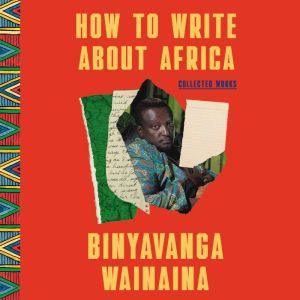
List: $22.50
| Sale: $16.20
Club: $11.25
How to Write About Africa
Collected Works
Narrator: Dominic Hoffman, Yinka Ladeinde
Unabridged: 14 hr 10 min
Format: Digital Audiobook Download
Publisher: Random House Audio
Published: 06/06/2023
Category: Social Science - Essays
Synopsis
From one of Africa’s most influential and eloquent essayists, a posthumous collection that highlights his biting satire and subversive wisdom on topics from travel to cultural identity to sexuality
“A fierce literary talent . . . [Wainaina] shines a light on his continent without cliché.”—The Guardian
“Africa is the only continent you can love—take advantage of this. . . . Africa is to be pitied, worshipped, or dominated. Whichever angle you take, be sure to leave the strong impression that without your intervention and your important book, Africa is doomed.”
Binyavanga Wainaina was a pioneering voice in African literature, an award-winning memoirist and essayist, and a gatherer of literary communities. Before his tragic death in 2019 at the age of forty-seven, he won the Caine Prize for African Writing and was named one of Time’s 100 Most Influential People. His wildly popular essay “How to Write About Africa,” an incisive and unapologetic piece exposing the harmful and racist ways Western media depicts Africa with implicit bias and subjective clichés, changed the game for African writers and helped set the stage for a new generation of authors, from Chimamanda Ngozi Adichie to Yaa Gyasi. When Wainaina published a “lost chapter” of his 2011 memoir as an essay called “I Am a Homosexual, Mum,” which imagines coming out to his mother, he became a voice for the queer African community as well, adding a new layer to how African sexuality is perceived.
How to Write About Africa collects these powerful pieces in a lively and imaginative set of essays about sexuality, art, history, and contemporary Africa. Wainaina’s writing is playful, robust, generous, and full-bodied. He describes the modern world with sensual, emotional, and psychological detail, giving us a full-color view of a country and continent. These works present a portrait of a giant in African literature who left a tremendous legacy.
“A fierce literary talent . . . [Wainaina] shines a light on his continent without cliché.”—The Guardian
“Africa is the only continent you can love—take advantage of this. . . . Africa is to be pitied, worshipped, or dominated. Whichever angle you take, be sure to leave the strong impression that without your intervention and your important book, Africa is doomed.”
Binyavanga Wainaina was a pioneering voice in African literature, an award-winning memoirist and essayist, and a gatherer of literary communities. Before his tragic death in 2019 at the age of forty-seven, he won the Caine Prize for African Writing and was named one of Time’s 100 Most Influential People. His wildly popular essay “How to Write About Africa,” an incisive and unapologetic piece exposing the harmful and racist ways Western media depicts Africa with implicit bias and subjective clichés, changed the game for African writers and helped set the stage for a new generation of authors, from Chimamanda Ngozi Adichie to Yaa Gyasi. When Wainaina published a “lost chapter” of his 2011 memoir as an essay called “I Am a Homosexual, Mum,” which imagines coming out to his mother, he became a voice for the queer African community as well, adding a new layer to how African sexuality is perceived.
How to Write About Africa collects these powerful pieces in a lively and imaginative set of essays about sexuality, art, history, and contemporary Africa. Wainaina’s writing is playful, robust, generous, and full-bodied. He describes the modern world with sensual, emotional, and psychological detail, giving us a full-color view of a country and continent. These works present a portrait of a giant in African literature who left a tremendous legacy.